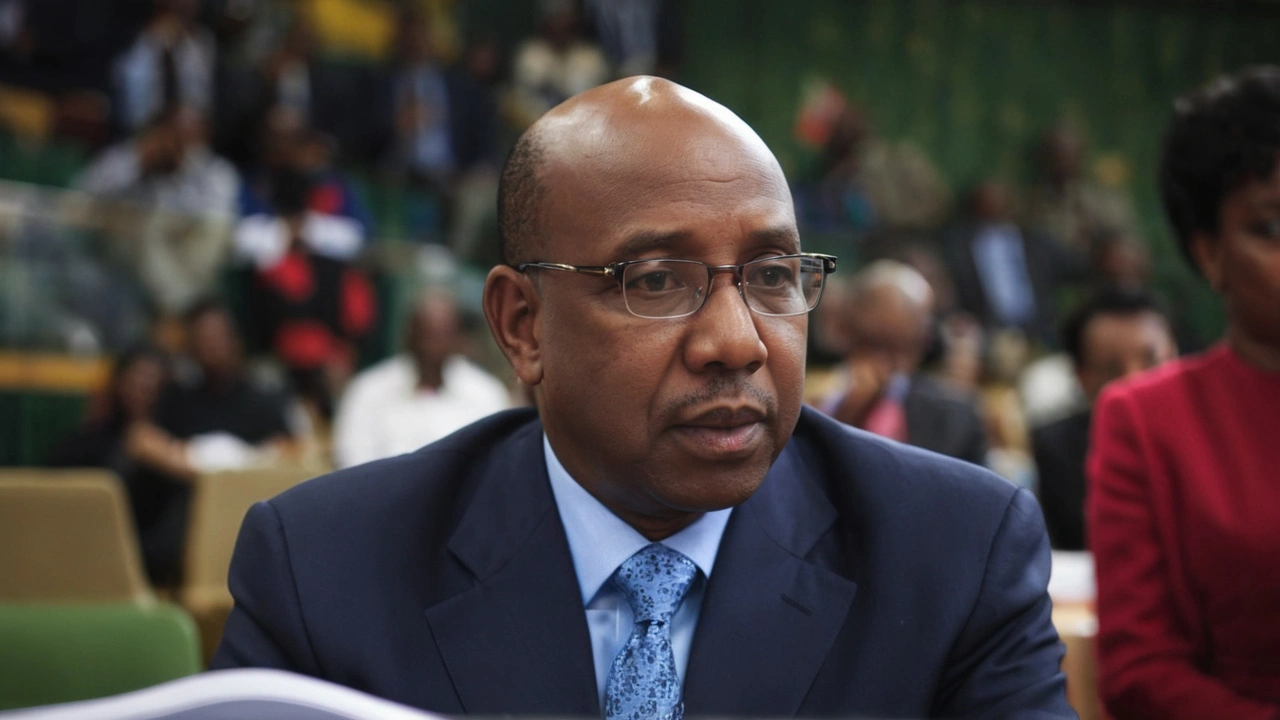Kenyan Businessman Jimi Wanjigi Sought by Police for Alleged Role in Anti-Government Protests
Keni Wanjigi, a prominent Kenyan businessman, has found himself at the center of a political storm as police seek his arrest over accusations of orchestrating a series of anti-government protests. The businessman and political strategist, who has never shied away from voicing his opinions on public matters, is now facing possibly his most serious challenge yet.
The back story here is that Wanjigi's name has long been associated with political intrigue in Kenya. His influence stretches back years, having played roles in various political campaigns and frequently casting himself as a critic of the status quo. But this latest chapter is different. The ongoing wave of protests roiling different parts of Kenya has created a climate of uncertainty, and Wanjigi is being singled out by authorities as a key instigator.
The Warrants and the Manhunt
The police have not minced words. A warrant for Wanjigi's arrest has been issued, and a nationwide manhunt is now underway. Authorities have made it clear they are intent on bringing him in for questioning. Law enforcement officials claim that Wanjigi has been instrumental in organizing these protests, which have seen thousands of Kenyans take to the streets expressing their dissatisfaction with the current administration.
The tension this situation has generated is palpable. Security forces have been deployed in significant numbers across the country. The authorities insist that maintaining law and order is their top priority, but this stance has triggered a diametric split in public opinion. On one hand, there are those who believe the government is justified in its actions, seeing them as necessary measures to prevent potential chaos. On the other hand, critics argue that the issuance of the warrant is a blatant attempt to quash political dissent and stifle freedom of expression.
The Protests and Public Sentiment
The protests themselves have not occurred in a vacuum. Kenya is currently facing a plethora of challenges that have fostered public unrest. Economic hardships, allegations of corruption within the government, and perceived inefficiencies in public service delivery are just some of the issues driving people to the streets. In this context, Wanjigi’s vocal opposition to the government has been interpreted by many as an attempt to channel this frustration into a coordinated movement for change.
His supporters argue that he is giving a voice to legitimate grievances held by many Kenyans. They see the government's move to arrest him as an abuse of power, pointing to previous instances where activists and opposition figures have faced similar treatment. The tension has only been exacerbated by social media, where public discourse on the matter has been both fervent and polarizing. Hashtags supporting Wanjigi and condemning the government's actions have trended, alongside a flood of opinions from both domestic and international observers.
Political Ramifications
This incident has broad implications for Kenyan politics. It brings to the forefront questions about the limits of free speech, the right to assembly, and the government's tolerance for opposition. If Wanjigi is indeed arrested, it could either quell the protests temporarily or further inflame public sentiment against the administration.
The opposition parties have seized on this opportunity to rally their bases, calling the warrant a sign of governmental overreach. They argue that it is indicative of a broader trend of the administration curtailing civil liberties to suppress dissent. Such narratives are gaining traction among those who are already disillusioned with the current state of affairs.
Analyzing the Responses
There are also concerns about how this situation could affect Kenya’s international standing. Human rights organizations have already begun to voice their concerns, with some urging the government to respect democratic principles. If the government is seen as heavy-handed in its approach, it could face condemnation from the international community, potentially impacting foreign aid and diplomatic relations.
It is also important to consider the long-term effects on domestic politics. The move against Wanjigi could set a precedent for how future dissent is handled, effectively reshaping the political landscape. If the government believes it can silence opposition by legal means, it could embolden similar actions against other critics, leading to a chilling effect on political discourse.
Conclusion: A Nation on Edge
Kenya stands at a critical juncture. The warrant for Jimi Wanjigi’s arrest, and the subsequent manhunt, highlight the complex interplay between authority and dissent in the nation. As the country grapples with economic, social, and political challenges, the actions taken now will resonate for years to come. For many, Wanjigi's case is not just about one man but serves as a litmus test for the country's democratic values and its willingness to tolerate dissent.
The coming days will be crucial. As more protests are anticipated, the authorities will need to navigate this situation carefully. A balance must be struck between ensuring public order and respecting the rights of citizens to express their views. The world watches as Kenya faces this test of its democratic principles.







Comments
Richard Berry
man this is wild. i dont know if he did it or not but the way the gov is going after him feels like a distraction tactic. they got problems, they pick a rich guy to blame. classic move.
Sandy Everett
It's important to remember that protest is a constitutional right, even when it's messy. Whether Wanjigi is involved or not, the real issue is why so many people feel they have to take to the streets. The system needs fixing, not just scapegoats.
J Mavrikos
This is exactly why we need more transparency. If he’s guilty, charge him with proof. If he’s not, stop the witch hunt. Kenya deserves better than fear-based politics. Let the facts speak, not the headlines.
Stuart Sandman
Let’s be real - this isn’t about protests. This is about the global elite using Kenya as a pawn. Wanjigi’s been funding independent media, right? That’s why they want him gone. The IMF, the World Bank, they’re all behind this. They don’t want a sovereign Africa. Mark my words - this is the first domino.
DJ Paterson
There’s a difference between dissent and disorder. But the moment a state starts treating its critics like enemies, it stops being a democracy and starts becoming a performance of one. Wanjigi may be loud, maybe even reckless - but silencing him doesn’t solve the anger. It just buries it deeper.
Nikhil nilkhan
I’ve seen this before in my village - when the system fails, people find someone to blame. But real change doesn’t come from one man. It comes from millions of quiet acts of courage. Let’s not turn him into a martyr or a villain. Let’s fix the system.
Damini Nichinnamettlu
This man is a traitor. He’s using money to destabilize Kenya. The government is doing its job. No country survives if its citizens are allowed to be incited by rich outsiders. Stick to business, Jimi. Stay out of politics.
Vinod Pillai
This is textbook sedition. He’s not a businessman - he’s a political saboteur. Using economic power to manipulate public sentiment is a crime against the state. Arrest him. Charge him. Send a message: Kenya will not be blackmailed by elites.
Avantika Dandapani
I just... I can’t imagine what it feels like to be watched, hunted, just because you speak up. My uncle was arrested for a protest in ’98. He never came back the same. Please don’t let this become another story of a broken promise.
Ayushi Dongre
The constitutional framework of the Republic of Kenya enshrines the right to peaceful assembly and freedom of expression. Any action taken against an individual must be predicated upon due process and admissible evidence, not political expediency. One must question the legitimacy of a warrant issued under conditions of heightened public anxiety.
rakesh meena
Protests happen when people have nothing left to lose. If the system worked, no one would need a billionaire to lead them. The real question is why are so many angry?
sandeep singh
You think this is about justice? No. This is about control. Wanjigi is rich. Rich people don’t get to challenge power. That’s the rule. He’s not innocent. He’s dangerous. And dangerous people disappear. Welcome to Kenya 2024.
Sumit Garg
This is precisely what happens when you allow populists with capital to weaponize social discontent. Wanjigi isn’t a freedom fighter - he’s a rent-seeking oligarch playing the same game as the politicians he claims to oppose. The only difference? He’s got better PR.
Sneha N
💔 This is heartbreaking. I’m crying right now. Kenya is losing its soul. I’ve been following this since Day 1. The tears, the chants, the fear in people’s eyes... it’s all too much. 🌍✊ #JusticeForWanjigi
Manjunath Nayak BP
Look, I’ve been tracking this since the first protest. I’ve got spreadsheets, Telegram logs, encrypted chats. Wanjigi didn’t organize it - he was the beneficiary. The real organizers are the diaspora groups funded by foreign NGOs with ties to the CIA and MI6. They’ve been preparing this for two years. The hashtag #WanjigiIsATool was trending in Berlin before it hit Nairobi. This is a hybrid warfare operation. You think this is about fuel prices? Nah. It’s about regime change. And they’re using him as a figurehead because he’s rich enough to be believable. They don’t care if he’s guilty - they just need him to be visible. That’s why the police are so desperate to catch him. He’s a symbol. And symbols are easier to crush than ideas.
Tulika Singh
Maybe the answer isn’t who started it. Maybe it’s why it spread so fast.
naresh g
Wait... so he’s a businessman? Then why is he even involved? Why not just stay out of it? And why now? This smells off. There’s more here. Why not just let the protests burn out? Why arrest him? What’s the real motive? Who benefits? Who’s watching? Who’s pulling strings? Who?
Brajesh Yadav
This is the end of Kenya as we know it. 😭💔 The youth are rising. The rich are running. The police are scared. The world is watching. And the government? They’re hiding behind warrants. This is not justice. This is fear. And fear doesn’t build nations. It burns them. #WanjigiIsTheFuture 🌅✊